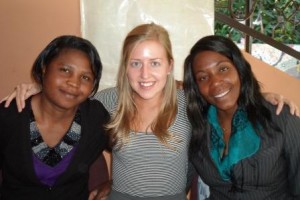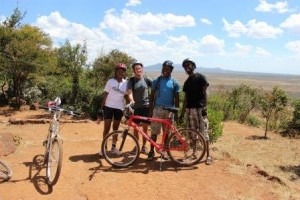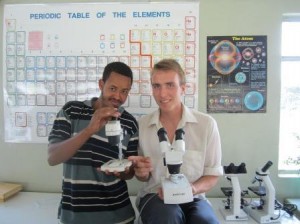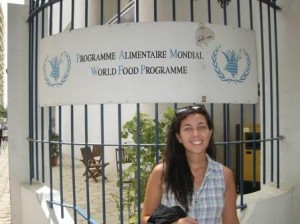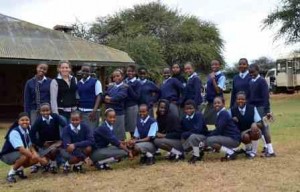July - August 2013
Dear Friends,
Here in the PiAf office we’ve compiled some interesting facts about our new 2013-14 fellowship class to share with you (and you can read all about our new Fellows here):
+ From 466 applications, we selected 46 Fellows – a highly competitive 10% placement rate.
+ This year’s Fellows will work with 25 partners in 15 African countries.
+ They graduated from 30 different colleges/universities with 41 different majors, from Civil Engineering to International Politics, Anthropology to Biology.
+ They speak 26 languages and come from 5 different countries and 18 different states.
+ Prior to joining PiAf, they had studied or worked in 38 different countries abroad.
This summer, we’ve also been reflecting on our incredible partner organizations:
+ Over a decade later, we still place Fellows with our very first partner – the International Rescue Committee.
+ 88% of last year’s partners requested a Fellow again for the current fellowship year.
+ 12 organizations have partnered with PiAf for 5 years or more.
+ 17 organizations have hosted 5 or more PiAf Fellows over the years.
+ 22 organizations have joined PiAf as new partners since 2010.
+ Since we were founded, we have worked with more than 70 organizations in 34 African countries.
With this issue, we say farewell to our 2012-13 Fellows, we continue to welcome our 2013-14 Fellows as their new journey in Africa begins, and we gear up for our next fellowship year – our 2014-15 fellowship application will go live in late August and applications will be due by Nov. 6th at 11:59 p.m. EST. Please check out our website for more information or email piafapp@princetoninafrica.org.
Enjoy this edition of the Fellows Flyer!
Warm Regards,
Katie Henneman
Executive Director
PiAf Connections
Please click below to check out pictures of our Fellows, Alums and other members of the PiAf family meeting up at home and around Africa.
Notes from the Field
By Kate Albers, 2012-2013 Fellow with African Impact in Zambia
As I drove over dusty potholes and through a maze of shacks, shops, and people to the school, I silently counted the reasons to keep expectations low:
1) It’s the first Adult Literacy program ever run in this area.
2) It’s 14 hours, so most will still be at home eating their nshima.
3) The potential students are women who work in the market, so they may still be working.
As we rounded the corner into the “Local Cowboy” school, my heart sank – it appeared to be completely deserted. We carried our books to the door of the classroom and I explained to the volunteers that since no one had come, we could spend the time lesson-planning instead.
Then I opened the door. Packed into corners, tables, and mats on the floor, were over 70 women. Dressed in their finest brightly-colored chitenge and balancing their babies on their backs, they stood with an exuberant “Good morning, teacher!” They held roughly used notebooks and stubbed pencils in their hands, their faces earnest and expectant. The tears that sprang into my eyes were part relief and part shock, but it was undoubtedly the happiest moment in my year in Zambia.
Throughout my time here, it has been Zambian women who have made the greatest impression on me. In their spirited and open way, my female Adult Literacy students and colleagues showed me how to laugh at life’s irritations, truly relax without agenda, and most of all how to persevere through adversity. I now understand that as they guided me through the confusion of cultural difference, they were revealing to me invaluable secrets of how to live.
When I consoled my coworker Esnart for her third bout of malaria, she laughed and slapped my hand away, exclaiming “Me, I am strong!” A student from Adult Literacy came up to me once after class, explaining that she was absent due to hospital visits for her son. She asked: could I please assign her extra work so she could keep up her learning? At every office function or any chance they get, the Zambian ladies dance the entire time, carrying me along with them. Whenever I try to escape this public humiliation, I hear, “Katie, we want to see you dance! Be free!”
We may intellectually understand the value of perspective, hope, and communal joy, yet these are things for which the first world starves. The women I’ve come to know in Zambia understand that these aren’t just beneficial qualities, but essential survival tools. In a country where death, disease, and violence form the fabric of everyday life, the women in my workplace and in Adult Literacy class have the amazing ability to identify what is truly important, where to find inner peace, and how to celebrate. While I first interpreted their energy as a means to avoid hardship, they showed me that it is in fact an indivisible expression of that hardship – a life choice designed to uplift and encourage one another. I am forever indebted to them for their generosity and incredible wisdom, without which I would have lost my own spirit and drive. I am forever committed to a career designed to better their circumstances as best I can in return.
Notes from the Field
By Shameika Black, 2012-2013 Fellow with Olam International in Gabon
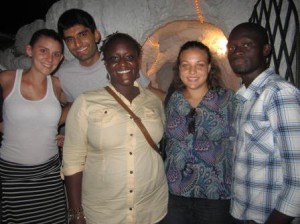
Lisa Hendrickson, Nabil Hashmi, Akornefa Akyea and Shameika (second from right) on a Francophone excursion with their French instructor.
I was extremely excited to start my fellowship with Olam International – an agricultural supply chain – in Gabon. As you can imagine, moving to a small Central African nation you know very little about is thrilling and, well, utterly terrifying. After finishing my fellowship and as I begin reflecting on my experience, here are five of the most important lessons I learned:
1. Moving to a country that you have never been to and do not speak the language takes WORK; very purposeful, conscious, patiently self-controlled work. Give yourself time.
Before I could speak French well enough to move around on my own, I truly struggled to adjust to life in Gabon. I had lived in Africa before and I was doing my very best to learn and use French. So, why then was I having such a hard time? Maybe because it was a HUGE adjustment and things like that take time. Thankfully, I became more patient with myself and did everything I could to understand Gabonaise culture.
2. Being “qualified” is simply a state of mind and some Google research away. I am about 90% sure that most people are under qualified or at least wholly unprepared for the jobs they are hired for. The good news is you can and will learn… if you so desire.
I created an entire grievance procedure and implementation protocol from scratch with, let us just say, minimal guidance. Although I was completely overwhelmed and constantly second guessing my work, the procedure is now being used as the standard throughout Olam plantations in Africa.
3. Navigating work relationships in an international setting requires finesse and constant probing. That being said, you will be thoroughly offended and that is valid.
While working on my project, I found myself butting heads with the head of the IT department. In an effort to resolve the issues we were having, that were undeniably a result of sexism, I was told I need to be “more culturally sensitive of the fact that he comes from a culture where they do not have to work with women as equals.” After I picked my jaw back up off the floor, I realized there was some underlying validity to the advice given – cultural understanding and sensitivity works both ways.
4. French is a beautiful language, particularly Africanized French.
+ “Aimer” means both like and love in French. Apparently, “one cannot love an object,” as one instructor elegantly told me.
+ Chonger (v): to be spell-bound.
+ “La go lá,” meaning ‘that chick/girl there” is a blast to say. As is the male equivalent “djo.”5. Development work in Africa is all about achieving balance.
There are three major goals in the for-profit development sector: 1) sustain business; 2) improve the livelihoods of people; and 3) making those projects self-sustaining. Frequently, these goals are in opposition to each other. Thus, as we work toward African advancement and growth, we must understand that there will always be give and take and we must find the best balance.
Notes from the Field
By John Drollinger, 2012-2013 Fellow with International Rescue Committee in Kenya
Me: I was thinking about the ride back from Ngong Hills tomorrow. How long did you say it was?
Rakesh: About 50km.
Me: And how many km is the ride through the hills?
Rakesh: It will be about 30km.
Me: Got it. That part sounds great. I’m just a bit worried about the 50km ride back.
Rakesh: Don’t worry, it’s mostly downhill.
You’re expecting a triumphant story of me tackling the long, arduous ride back with a newfound sense of pride and accomplishment, right? Nope. When we finished the exhausting 30km in the hills, someone mumbled an excuse that they had to be back in town for something, and we all happily packed our bikes in the car and drove home. As usual, the road back was not “mostly downhill,” which was his frequent motivational tool to keep us going.
Getting a bicycle in Nairobi was one of the best decisions I made during my fellowship. It gave me freedom to discover the city, it made me a new lifelong friend, and it sent me on adventures through Hell’s Gate National Park with two of my best friends and co-fellows, Dara Carroll and Marielle Schweickart. When I had a tough week at work, cycling around the neighborhood helped me clear my head and relax (despite the hectic roundabouts—don’t worry, I wore a helmet!).
The first time I had ever been mountain biking was that trip through the Ngong Hills, just outside of Nairobi. In fact, the fellowship gave me many firsts and helped me say “yes” more often than I did before. In April, I bungee jumped for the first (and maybe last) time. I said “yes” to multiple cramped, overnight bus rides, and I ended up with more stories and memories than I could have imagined.
This past year helped me discover the more adventurous side of myself and uncover a dynamic perspective of Kenya. My work with the International Rescue Committee (IRC) in Nairobi let me see and learn about Kenya’s development and emergency response landscape, and the bike trips allowed me to experience Kenya much differently.
In July, I started a new job with the IRC in Juba, South Sudan, and naturally, I brought my bike with me from Kenya. Now, it’s time to hop on it and hit the streets of Juba. Though life here can be challenging, I’m not worried—it’s mostly downhill.
Notes from the Field
By Thomas Launer, 2012-2013 Fellow with Project Mercy in Ethiopia
To say that I’m enjoying myself here at Project Mercy would be a massive understatement – I absolutely love it. Every day I am surrounded by hundreds of happy children, all of my meals are nutritious and served to me by a wonderful staff, the other American volunteers here are fantastic people, I’m not bothered by distractions such as TV and internet (sorry, PiAf staff!), the compound is in a beautiful location in the cool climate of southern highlands… Ok, Ok. I’ll stop there because I could probably go on like that forever and I learned from our Fellows’ retreat that nobody really likes to listen to somebody rattle on about how great their life is. It’s also, unfortunately, not really the whole truth because there are a lot of challenges for me and especially for my students.
Project Mercy is a grassroots development NGO which focuses on the long-term progress of the surrounding community through a variety of programs including healthcare, education, agriculture and job creation. Though I do think it’s a very progressive organization, the way the school is run is certainly not. An American professor of education who was born and raised in Ethiopia came to visit and lamented the fact that the teaching resembled the way things were for him nearly 40 years ago. Classrooms fit more children than seems possible and it’s difficult to manage that many kids, let alone teach them. The students, in turn, will either miss everything or focus all of their energy on memorizing their notes word for word to prepare for their multiple choice exams. The few of them that do make it to the high school do so knowing full well that whatever questions they may encounter in life will have exactly one correct answer, which they can probably find in a book somewhere. I should also mention that education in our region is conducted entirely in English, a third or fourth language for our students, and one not spoken all too well by the other Ethiopian teachers.
So, looking now at what I’ve written about our school’s problems, it seems to contrast pretty starkly with my happiness and optimism. But this is a nation of contrasts, so what else can I do? Spend just one day in any city in Ethiopia and you’ll see it for yourself: wealth and poverty, modernity and tradition, growth and stagnation – all in a beautiful setting riddled with filth. I don’t want to suggest that we should become complacent with these problems, but if we just sat down and cried whenever we encountered trouble, what would we ever accomplish? It’s also helpful that Ethiopians are, collectively, the silliest people I’ve ever lived with. I’ve not yet had a dull day here and I’ll be forever grateful to Ethiopia for teaching me that it’s OK to be goofy in any setting at any time. With that being said, my student, Bezawit, would like to take this opportunity to say, “Hi, America!”
Notes from the Field
By Elizabeth Mulvey, 2012-2013 Fellow with the World Food Programme in Senegal
PRRO under SO1 and SO3 covering MAM treatment and FFA activities for CDI HCs.
Kind of sounds like a foreign language, right? In short, this phrase describes a typical protracted relief and recovery program, one of WFP’s many food assistance operations. If I had to describe my fellowship experience in simple terms, I would say, both literally and figuratively, it’s been a lot like learning a new language.
In Senegal, there are a plethora of languages spoken from Wolof, Jola, Mandinka, and Pulaar to French. Luckily, people here are easygoing and friendly even when you don’t speak one of these dialects. The opportunity to start learning a new language though is all around. Casual conversations are common, and I find myself having chats with the guardians at my apartment building, Rama the cook in the canteen at work, my coworker Salif, and my friend Barry from the local university.
In the context of Senegal, I’ve had to adjust to my first year in the working world. The World Food Programme, my placement organization, practically has a language of its own; a long list of acronyms is frequently employed, and WFP’s operations themselves are large-scale and complex. These are particularly essential for my role in the Programme Support Unit to master, as we help country offices draft proposals for food aid interventions. In the regional bureau, I’ve also taken on a supervising role overseeing the 19 country offices. During college, the ‘teacher-student’ relationship was custom, and receiving guidance and direction from my professors was comfortable. During my fellowship year, I’ve had to learn the delicate art of supervision and leadership, which requires a new and unfamiliar way of communicating with people.
Taking on these new roles in a new environment, I’ve had to navigate different interactions and employ new ways of communicating. When I address people here I find I am more aware of myself and my position. Over the year, broad questions about identity and one’s place in the world come up, and demand self-reflection. In one year, I will never speak all the local languages or fully understand all of WFP’s operations. I’ve made progress though; and as I become more fluent, the more questions I now have, surprisingly enough, and the more questions I am actually able to ask.
Notes from the Field
By Morgan Pecora-Saipe, 2012-2013 Fellow with Mpala Research Center in Kenya
I returned to Mpala Research Centre (MRC) in September as the Princeton in Africa Fellow with the purpose of managing and expanding the outreach. This is my third visit to MRC – I first came as an undergraduate student, then a research project manager. Throughout my time at MRC, my perception of conservation has transformed. Initially I viewed conservation as a tool to manage the expansion of development; however, I now regard conservation as an integral form of development.
We are located in Laikipia County in central Kenya where the landscape is a blend of extremely diverse wildlife and large herds of domestic cattle, sheep and goats. MRC is part of a working cattle ranch and wildlife conservancy, creating an area where humans, wildlife and research coexist. As a research institution, MRC hosts scientists who investigate a range of subjects – the social system of Superb starlings, the population of the endangered Grevy’s zebra, and innovative cattle grazing and management methods, just to name a few. I decided to transition from ecological research to community development as I realized that conservation is only successful in tandem with sustainable economic and human development.
So, how do we promote conservation as a benefit to development?
I conducted an economic survey of MRC to quantify the monetary value research adds to the local community and economy. Employment, consumption, employee benefits, and community outreach initiatives were combined with the scientific discoveries produced by MRC researchers to illustrate the wide-reaching impact MRC contributes. For example, MRC has over 100 employees, on average each supports eight dependents and MRC purchases from more than 70 businesses. In addition, MRC researchers have contributed to a greater understanding of landscape dynamics through studies on cattle bomas, wildlife-livestock populations and the impact of vegetation burns, all which have significant implications for land management in Laikipia. By focusing on the ecological dynamics, MRC can improve human-wildlife coexistence, thus the conservation of the land promotes sustainable development.
Currently, the conservancy MRC is located on and our neighboring conservancies are at risk. A government project plans to build a high voltage transmission line from Ethiopia, through northern Kenya, across Laikipia County and to the rift valley where the electricity will be converted for use – no one along the line will benefit from the electricity. Conservationists are challenging the choice to build the line through a high value tourist and ecological area. The proposal is to redirect the line to follow a pre-existing road; this will increase the cost but not decrease the value of Laikipia. It is important to identify the value of MRC’s conservation and research to illustrate that our land-use system adds economic value and is a benefit to sustainable human development.
MRC’s outreach programs educate and promote conservation as a meaningful and valuable asset for the population. This education is important to change the perception of conservation to a value-added activity. My role at MRC has given me the opportunity to help effect such a change within the communities we serve.
Notes from the Field
By Marielle Schweickart, 2012-2013 Fellow with Sanergy in Kenya
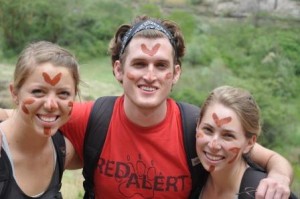
Marielle (left) hiking in Hells Gate National Park near Lake Naivasha with PiAf Fellows John Drollinger (center) and Dara Carroll.
“Bins,” I say to the piki piki (motorcycle) driver, even though he knows exactly where I, the only foreigner around, need to go. I’ve just traveled over an hour by public transport—first a bus to town, then a 14-seater van called a “matatu” down the road that leads from Nairobi to Mombasa—to get to the stop closest to the slum where I’ve been working for the past 12 months. I hop onto the back of the motorbike and spend the second to last 5 minutes before arriving at work closing my eyes and pretending I’m flying as we glide down the smooth road…and the last 5 minutes before arriving at work holding on for dear life as we bounce down the unpaved roads leading to Sanergy’s field office.
I used to have no idea what a slum looks like. Now I work on the edge of one of Nairobi’s numerous informal settlements. Most people get grossed out talking or even thinking about human waste. I’ve found that I have become absolutely and completely desensitized to the subject, even at the dinner table. Listen, if you were sent on a “transect walk” to understand the feasibility of moving our operations into a new area the first month of work, you would be too. During said walk, I was the designated photographer. What does this mean? Just that I snapped pictures of open defecation and the inside of toilets for hours. Let me tell you what a great photographer I am. Snapped some masterpieces. And then stepped in some poop.
Oh! I forgot to mention what I’m doing here. I work for a start-up with a social mission called Sanergy. In a place where pay-per-use pit-toilets is the norm, and human waste is emptied manually (i.e. carried in a giant barrel to a river via wheelbarrow), we franchise squat toilets that are clean and sanitary for the entire community. Just like a McDonald’s in the United States is synonymous with frustratingly delicious French fries, our Fresh Life brand of toilet (“live fresh!”) is known in the community for providing hygienic sanitation. We sustain our business by collecting the waste every day, turning it into organic fertilizer, and then selling it to upcountry farms. Soon we hope to be producing biogas with the waste, which can be sold back to the Kenyan government in the form of electricity. I personally work on Sanergy’s internal operations efficiency consulting team and manage our Kiva partnership.
Now, just some general questions I have from living in Nairobi:
1) Goats, why are you so loud outside of my office? How is it that sometimes you can sound like a very sad, sad baby and other times like a dying cat?
2) Nairobi radio, how do you manage to always play the Whitney Houston song I never knew I always wanted to hear on my way to work?
3) Chapati, how are you so good? Let’s be friends forever.








